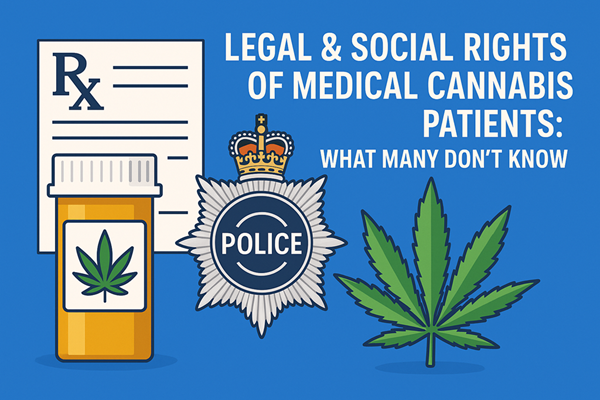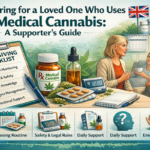Legal & Social Rights of Medical Cannabis Patients: What Many Don’t Know

When medical cannabis became legal in the UK in 2018, many believed it marked a new era of compassion and understanding for patients. Yet, years later, people prescribed cannabis-based medicines still face confusion, stigma, and even police challenges. The law might be on their side, but in practice, many medical cannabis patients continue to struggle with misunderstandings that affect their everyday lives.
Knowing your rights as a prescription holder
The law protects you if you have a legal prescription for medical cannabis. Specialist doctors can prescribe cannabis-based medicinal products under the Misuse of Drugs Regulations 2001 for specific health conditions. This means you can legally possess and use your prescribed medication as directed.
To avoid issues, patients should always:
- Carry their prescription with them
- Keep their medication in its original packaging
- Ensure their name, dosage, and prescribing doctor’s details are clearly visible
If the police or other authorities ever question you, these simple steps can significantly impact your situation. Having proof to hand shows that your use is legitimate and helps resolve misunderstandings quickly.
When the law meets real life
Unfortunately, not everyone working in law enforcement fully understands how medical cannabis works under UK law. Reports exist of police officers confiscating prescribed medication or detaining patients pending verification. Confusion or lack of awareness have left patients without access to their medication for days in some cases.
One patient travelling through an English county described being stopped for a routine check, only to have their legally prescribed cannabis seized by officers unfamiliar with the regulations. It took weeks to get it returned. Situations like these create unnecessary stress for patients who are already managing serious medical conditions.
The same confusion can happen in workplaces. Some patients report facing disciplinary action or stigma from employers, even though their treatment is fully legal. There are no clear national standards guiding employers on how to treat prescribed cannabis users, leaving room for unfair treatment or misunderstanding.
Travelling with medical cannabis
If you have a valid prescription, you can legally travel with medical cannabis in the UK, but it’s crucial to be well-prepared. Keep your prescription paperwork and original packaging with you, as some transport authorities and airport staff may still ask questions.
International travel is much more complicated. Each country has its drug laws, and even small amounts of medical cannabis could be treated as illegal abroad. Before travelling, patients should always check with the destination country’s embassy or consulate. Some nations, like Germany and the Netherlands, allow medical cannabis under strict import permissions, but you must apply in advance and carry proper documentation.
Without these permissions, even possessing prescribed medical cannabis in another country can lead to arrest. Planning ahead is essential to avoid serious legal trouble.
How patients can protect themselves
Until national awareness improves, patients must take extra steps to safeguard themselves. Some key measures include:
- Carrying both physical and digital copies of your prescription
- Printing the Home Office letter that confirms prescribed cannabis products are legal for patients
- Keeping your products sealed, properly labelled, and in their original containers
- Staying calm and cooperative if questioned by police and explaining your medical status clearly
- Informing your GP, workplace, or travel authorities in advance where appropriate
Groups like PLEA (Patient-Led Engagement for Access) and MedCann Support provide downloadable resources and templates to help explain your rights to employers, police, and the public.
The need for clearer guidance
While the UK government and Home Office acknowledge that prescribed cannabis is legal, there is still no consistent enforcement policy. Different police forces interpret the law differently, and many lack training for recognising prescription products.
The Advisory Council on the Misuse of Drugs (ACMD) has recommended that police receive better education and that clearer product labelling is required from licensed producers. This would make it easier for authorities to confirm that a product is legal and prescribed, reducing unnecessary confrontations.
There are also calls for stronger workplace protections. Advocates argue that patients prescribed medical cannabis should have the same legal safeguards as those prescribed other controlled medications, such as opioids or benzodiazepines. Clarifying the situation could prevent discrimination and improve equality in healthcare and employment.
Tackling the social stigma
Even when patients are within their legal rights, social stigma remains one of the biggest challenges. Many people still associate cannabis with recreational use, which can lead to judgement or misunderstanding. Some patients avoid talking about their treatments entirely for fear of being labelled or treated differently.
However, attitudes are slowly shifting. More patients are sharing their experiences publicly, and awareness campaigns are helping normalise medical cannabis as a legitimate form of treatment. Each story shared brings the UK closer to treating medical cannabis users with the same respect as any other patient.
Doctors are also becoming more open to discussing cannabis-based treatments, particularly as research continues to grow. With more evidence and education, the conversation around cannabis in medicine is starting to change, though progress remains slow.
What still needs to change?
Before medical cannabis patients feel fully protected, there is still a significant amount of work to be done. The most urgent changes include:
- National police training to prevent wrongful stops and seizures
- Clear workplace policies to protect prescription holders from discrimination
- Easier access to travel permissions for international patients
- More public education to reduce stigma and misinformation
Without these improvements, patients will continue to face uncertainty about how their legal rights are applied in everyday life.
The bigger picture
Legalisation was only the first step. What patients now need is fairness, consistency, and understanding. Knowing your rights and staying informed can make all the difference when navigating the grey areas of the current system.
If you are a UK patient using medical cannabis, or you want to understand your legal and social rights more clearly, get in touch with us today for trusted information, patient advocacy, and updates on the latest cannabis legislation.


